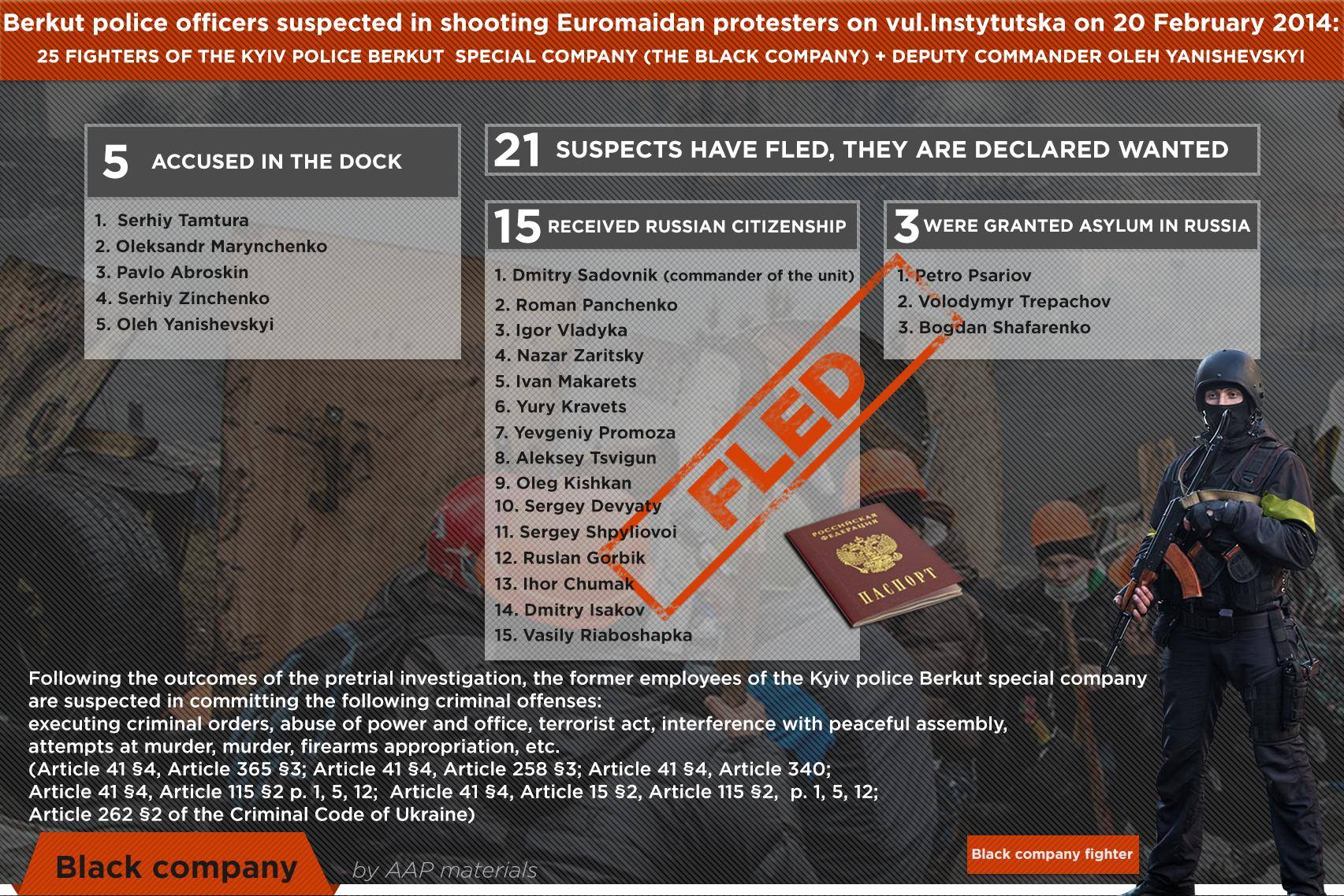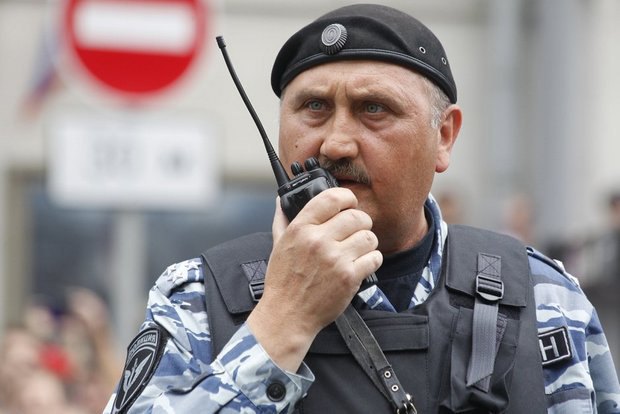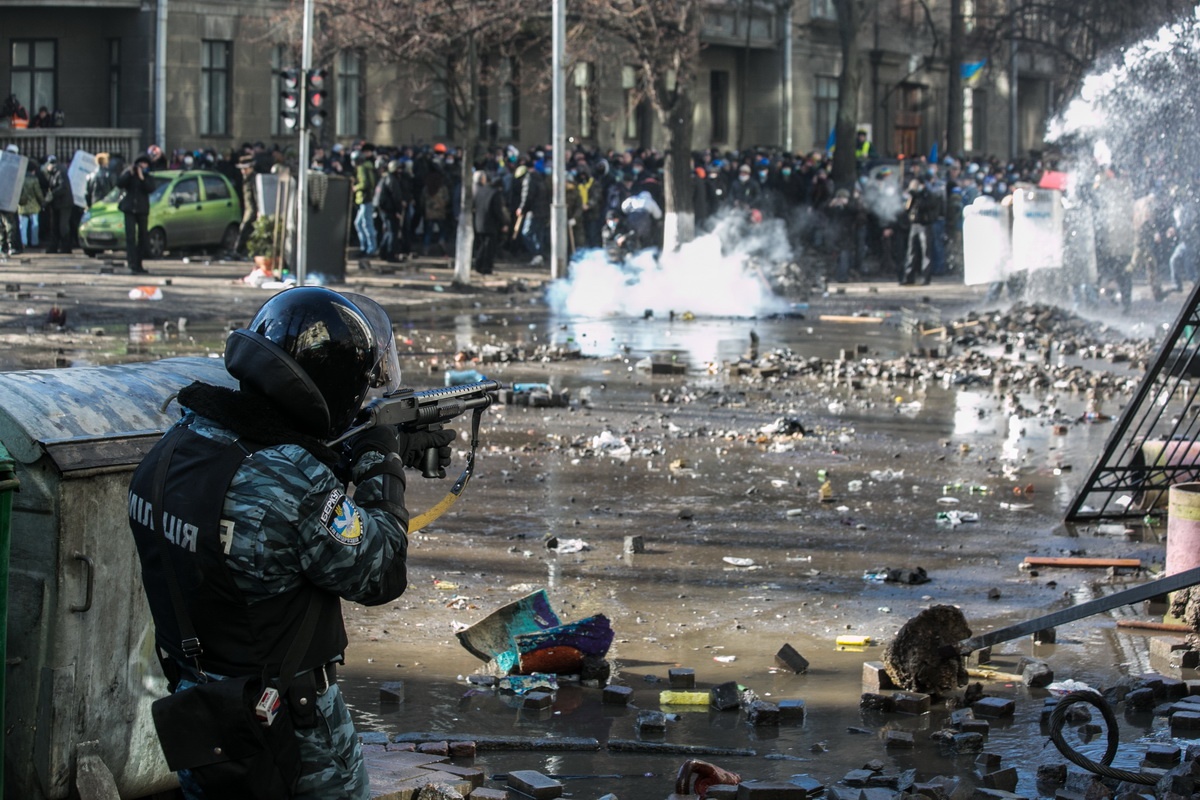On 20 February 2014, 48 participants of Ukraine’s pro-western Euromaidan protests were shot by the Berkut riot police. Shortly after, the protesters won, then-president Yanukovych fled, and a pro-western government came to power. A lengthy investigation into crimes committed against the protesters was launched.
According to its results, 25 members of the Berkut police from the “Black Company” and their deputy commander Oleh Yanyshevskyi carry responsibility for the death of their fellow unarmed citizens.
However, only 5 of those suspected in the killings will go to trial or face responsibility: 21 out of the 26 have escaped to Russia. Out of them, Russia has officially confirmed that 15 have received citizenship, and 3 were granted asylum. On 21 July 2017, Russia declined the request of Ukraine’s Prosecutor General’s office to extradite 21 suspects to Ukraine. It wasn’t the first one – the request sent in January received a similar response, only for a smaller number of Berkut officers.
Meanwhile, five police officers are under trial and will be brought to justice, according to the Advocacy Advisory Panel, a coalition of lawyers working to secure justice for the victims of the Euromaidan protests and their families. Yevheniya Zakrevska, a lawyer of the Advocacy Advisory Panel, expects that they will be a verdict in 2018. The rest will be tried in absentia, similarly to ousted ex-President Yanukovych.

What is the Black Company
Ukrainian journalists gave the “Black Company” of Berkut its name for the black uniform with yellow stripes which its fighters were wearing on the numerous video recordings of 20 February 2014. This is a special company of the special police regiment “Berkut,” subordinate to the Ministry of Internal Affairs of Kyiv. It was a SWAT team within a SWAT team.
In an interview to Open Russia, Yevheniya Zakrevska told that the “Black Company” was considered to be the most well-prepared and well-equipped Berkut unit. Only fighters of this company had a black uniform besides the camouflaged one. The commander of the unit was Dmitry Sadovnik.
Sadovnik was a remarkable figure: he commanded the special unit while being de facto disabled: he has no right hand. Because of this, he held his machine gun with the forearm of his right arm while holding it with his left hand, and pulled the trigger with the same left hand. Thanks to this firing peculiarity, Sadovnik was identified on one of the video recordings made in February 2014 on Euromaidan, Open Russia writes.

After the fall of Yanukovych’s regime, Sadovnik was taken into custody as one of the main suspects of the killings at Euromaidan and faced life imprisonment. But then the court changed his measure of restraint to house arrest (a result of the poor state of the Ukrainian judicial system, which is still awaiting its reform). A few weeks later, in early October 2014, he fled to Russia. According to data of the Ukrainian prosecutors, he received Russian citizenship on 4 December 2014, two months after escaping his arrest. 16 officers from his company managed to escape even earlier, in April 2014, apparently not without help, thanks to the poor work of the police and conflicts between different factions of the investigation.
Watch out for the ex-Berkut in Russia

Yevheniya Zakrevska warns Russians to watch out for the 18 Berkut officers suspected of murder who are now living in Russia.
“They could be working in the police. They could be ‘protecting law and order’ like their regiment commander Kusyuk… They can have weapons and shoot… They can do many things,” she wrote on Facebook.
Sergey Kusyuk, the Berkut chief infamous for his brutal dispersals of protests in Ukraine, including the brutal dispersal of students on 30 November 2013 which sparked the whole Euromaidan revolution, was spotted dispersing protesters in Moscow in June 2017, together with another ex-Berkut officer named Vasyl. Kusyuk was the direct superior of Dmitry Sadovnik, the commander of the “Black Company.” In Ukraine, he had the rank of a colonel; he was apparently accepted into this rank in Russia.
In Ukraine, Kusyuk is wanted for directing the dispersal of the student protest on 29-30 November 2013 together with his two deputies and four Berkut commanders. As well, he is suspected of organizing the Euromaidan massacre of 20 February 2014, during which 47 protesters were shot.
Four other Berkut fighters from another unit who were also accused of killing and severely injuring Euromaidan protesters ran away to Russia in April 2017. Only one had a measure of restraint. But Ukrainian ex-police employees who retained loyalty to the old regime, or feared punishment for committed crimes, started escaping to Russia or occupied Crimea right after Euromaidan.
A massive handout of Russian passports to Berkut officers in Crimea took place during spring 2014, before the Russian annexation, when units of the Crimean and Sevastopol Berkut refused to carry out the order of the new Minister of Interior Arsen Avakov on self-liquidation. The Russian Ministry of Foreign Affairs authorized the Russian consulate in Simferopol to give them Russian passports on 28 February 2014. After the annexation of the peninsula, they became part of the Russian OMON.
Colonel Petr Fedchuk is another Ukrainian ex-police officer who has found his place among the Russian police who was, like Kusyuk, noticed during a protest dispersal in Moscow. However, in Ukraine, he served not in Berkut but commanded the public security police in Kyiv. Like Kusyuk, he preserved his rank.
Open Russia notes that the Russian authorities regard the Berkut fighters who dispersed popular protest actions with utmost respect and that, most likely, the command to give these people Russian citizenship came from the very top: “the President of the Russian Federation is able to be sentimental in matters relating to the loyalty of executioners.”
However, getting the Berkut to Russia requires more than political will. The practical implementation of this operation, according to the information of the Russian anti-corruption portal Russiangate, was carried out with the help of such organizations as the Foundation for Support of Veterans of the operational services of Russia’s power departments “Center-T.” And Konstantin Zatulin, a Russian MP, and director of the Institute of CIS countries assisted with obtaining Russian citizenship, Russiangate writes.
Probably, even more faithful hounds of the Yanukovych regime are already wearing a Russian police uniform and getting ready for pacifying protests in Moscow, St.Petersburg, or wherever else the Russian population will try to stand up against its repressive regime.
Related:
- Separating myth from reality: 6 facts on the shooting of the Euromaidan protesters
- Ex-Berkut chief suspected of organizing Euromaidan massacre now dispersing protests in Moscow
- Unpunished for Maidan pacification, Berkut militia becomes Ukraine’s New Police
- Berkut militants will be given Russian passports
- Berkut [riot police] beats up 20 medical volunteers helping the wounded
- Council of Europe Report: Berkut tortured protesters
- Crimean “Berkut” beat and looted their prisoners
- Seven Killers of Euromaidan Protesters Have Been Arrested, Others Hiding in Crimea and Eastern Ukraine
- Berkut and Armored Vehicles Storm Maidan
- Twelve Berkut Arrested for Shooting Protesters
- Where is your Bandera? Berkut beat and tortured a detained student




